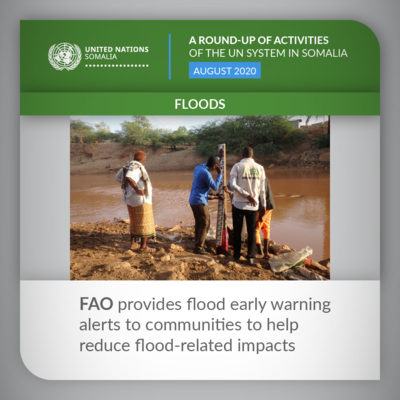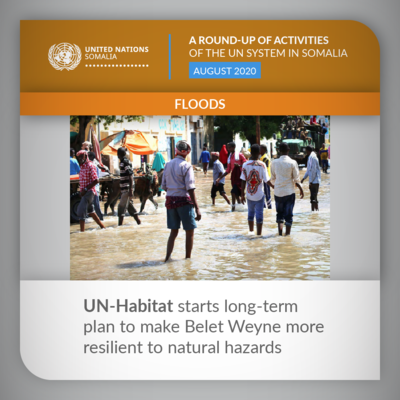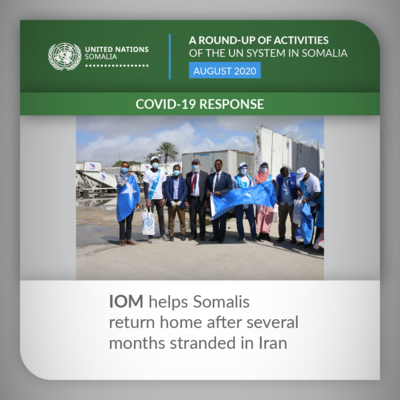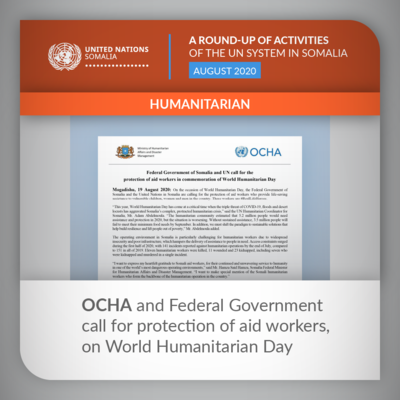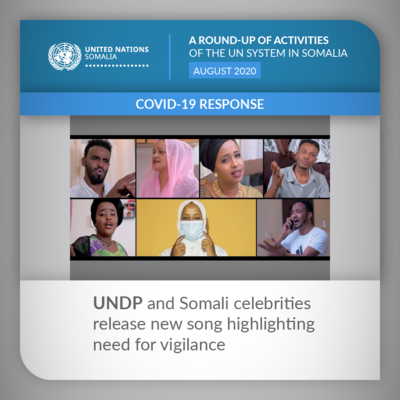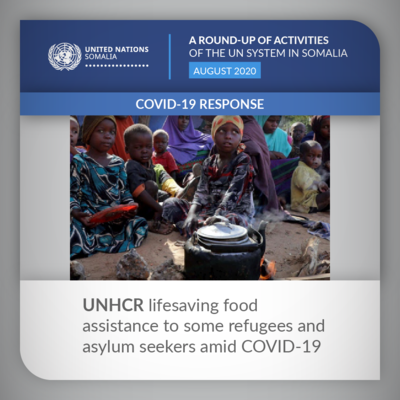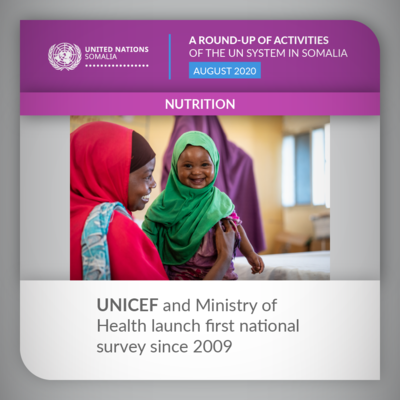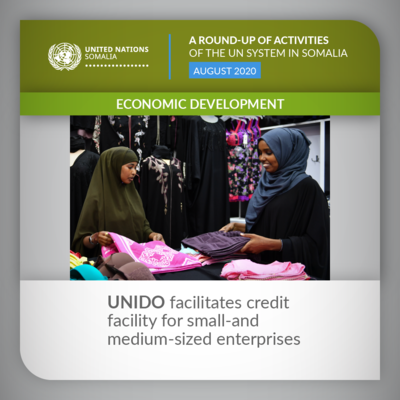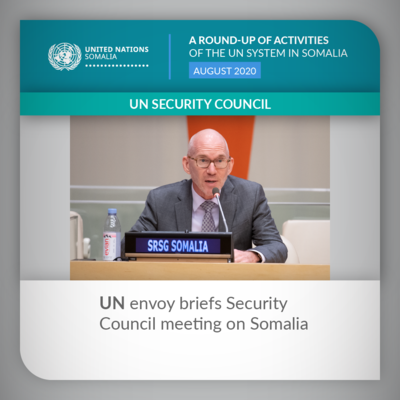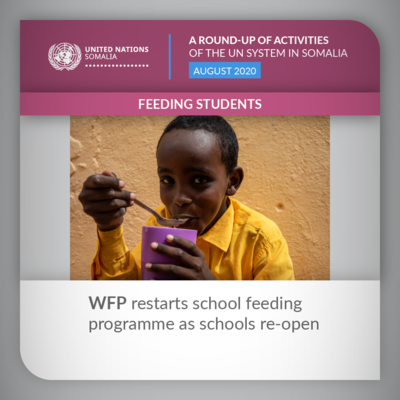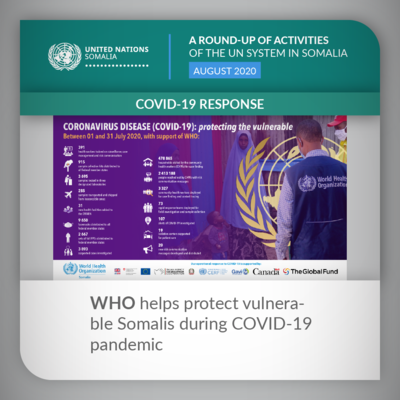A Round-Up of Activities of The UN System In Somalia In August 2020
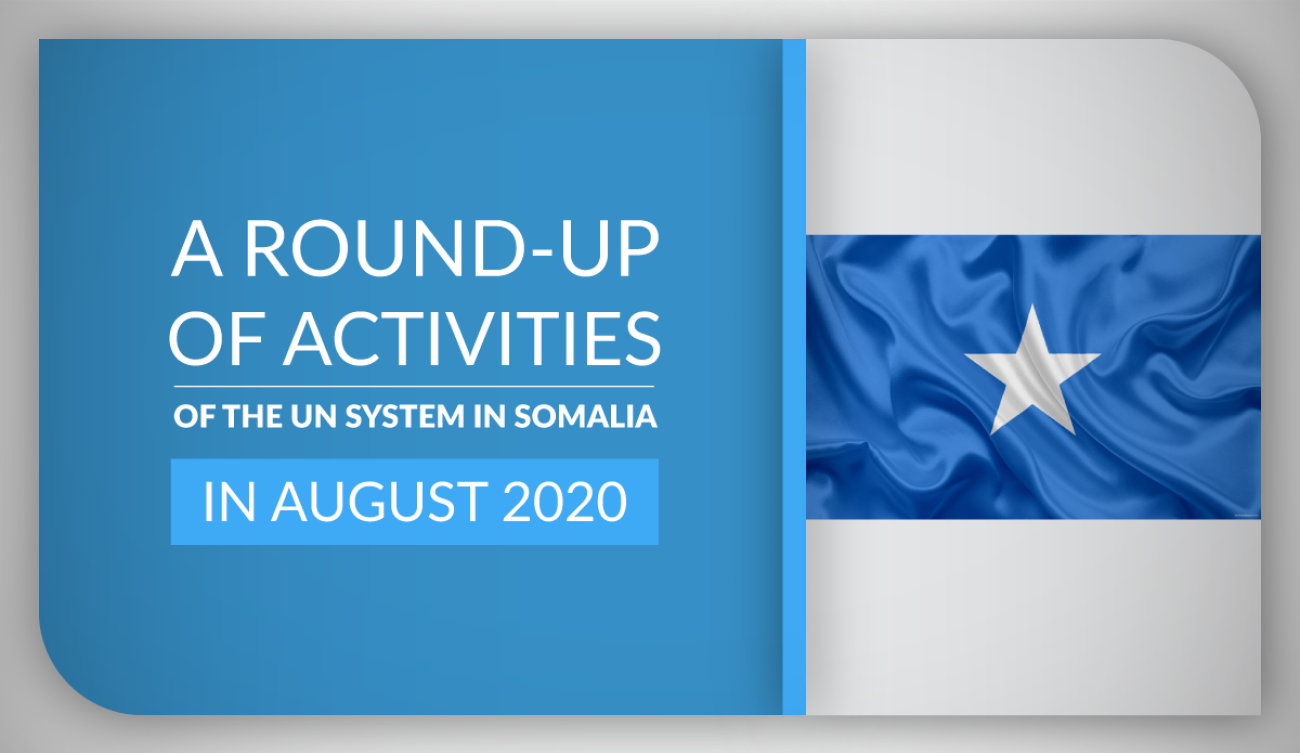
Highlights of some of the activities undertaken by the UN system in the month of August, 2020.
|
|
Floods | FAO provides early warning alerts to communities to help reduce flood-related impacts Somalis continue to suffer from droughts and floods that have grown in intensity, frequency and unpredictability. In August, increased rainfall in the Ethiopian highlands, and within the Shabelle basin, resulted in unexpected and unusual Hagaa floods along the Shabelle River. These severe floods added yet another shock to the already vulnerable livelihoods of many communities along the Shabelle River. FAO SWALIM (Somalia Water and Land Information Management) was able to help alert Somalis to the floods – four times in August – thanks to its network of gauge readers. These items monitor the development of the river levels and floods, and issue early warning messages for development partners and government institutions to take early action. Also, FAO SWALIM sent out 200 SMS messages during August to vulnerable community representatives to warn them of the impending floods through the Flood Risk and Response Information Management System, which contributed to reducing the impact in affected areas, thus saving lives and livelihoods. Further to these early warning systems, and in order to address this recurrent flooding issue in the short- and long-term, FAO, with the support of the Italian Government, is providing the Hirshabelle state authorities and the Federal Government with technical assistance to address the flood risk. |
|
|
|
Floods | UN-Habitat starts long-term plan to make Belet Weyne more resilient to natural hazards Belet Weyne, the largest city of Somalia’s Hirshabelle state, has constantly suffered from devastating floods. Over the past decade, floods have increased in magnitude and recurrence, reaching alarming levels by 2019, when 68 per cent of the city was flooded. Funded by the United Nations Peacebuilding Fund, UN-Habitat worked together with students from the Institute for Cooperation in Basic Habitability (ICHaB-ETSAM) in Madrid to develop a working paper, the aim of which is to establish the spatial basis for flood risk analysis and urban resilience in the city. This study has been conceived as a first step in exploring long-term solutions to make Belet Weyne, including its most vulnerable communities, more resilient to floods and other natural hazards. https://reliefweb.int/report/somalia/working-paper-flood-risk-and-resilience-beledweyne-somalia |
|
|
|
COVID-19 response | IOM helps Somalis return home after several months stranded in Iran A dozen Somali nationals, including a government official, were safely returned to Somalia after nearly six months of being stranded in Iran due to COVID-19 global movement restrictions. Their return was facilitated by IOM, in coordination with Somalia’s Ministry of Foreign Affairs and its Office of the Special Envoy on Migrant’s and Children’s Rights. IOM and the federal authorities are coordinating the return of Somali migrants stranded worldwide, following the resumption of international flights in Somalia and the region. https://www.iom.int/news/somali-migrants-return-home-after-several-months-stranded-iran |
|
|
|
Humanitarian | On World Humanitarian Day, OCHA and Federal Government call for protection of aid workers On World Humanitarian Day, marked on 19 August, OCHA issued a joint press statement from the Federal Government of Somalia and the United Nations system calling for the protection of aid workers who provide life-saving assistance to vulnerable people throughout the country. The statement highlighted that the operating environment in Somalia is particularly challenging for humanitarian workers due to widespread insecurity and poor infrastructure, which hamper the delivery of assistance to people in need. In it, the Federal Minister of Humanitarian Affairs and Disaster Management and the UN Humanitarian Coordinator for Somalia also praised the efforts of Somali humanitarians in their fight against the “triple threat” of COVID-19, floods and desert locust infestation. |
|
|
|
COVID-19 response | UNDP and Somali celebrities release new song highlighting need for vigilance UNDP and six of Somalia's most famous celebrities – Suldaan Seeraar, Hodan Abdirahman, Cabdi Hani, Yurub Geenyo, Abdirisaq Anshax and Nadiira Nayruus – released a new song to raise awareness of COVID-19. Reaching one million views in its first week online, the song has also been featured widely on radio and television and encourages listeners and viewers to stay vigilant against the possibility of a second wave of the virus. |
|
|
|
Midwifery education | UNFPA kickstarts new initiative on strengthening sexual and reproductive health and rights UNFPA and the Ministry of Health launched a new initiative on strengthening sexual and reproductive health and rights in Somalia through enhanced midwifery education and practice thanks to funding of around $8.4 million from the Government of Canada. The initiative includes a portion of the funds being dedicated to an enhanced response to the current COVID-19 pandemic with the aim of protecting health care providers and patients being treated at health facilities. |
|
|
|
COVID-19 response | UNHCR provides life-saving food assistance to refugees and asylum-seekers amid COVID-19 UNHCR and WFP have joined forces to provide lifesaving food assistance to some 30,000 refugees and asylum-seekers in Somalia. Distribution of the more than 1,500 metric tons of food began in August across Mogadishu, Galkayo, Bossaso, Berbera and Hargeisa. The food assistance will be a major boost to refugee and asylum seekers heavily impacted by the COVID-19 pandemic. A review conducted by UNHCR indicates that the vast majority of refugees and asylum-seekers calling the agency’s hotlines have lost their only source of livelihood since the pandemic was reported in Somalia in early March. Many refugees and asylum-seekers depend on casual labor or small business businesses to meet their needs. |
|
|
|
Nutrition | UNICEF and Ministry of Health launch first nutrition national survey since 2009 Somalia’s Federal Ministry of Health and UNICEF launched the ‘Micronutrient Survey,’ which shines a spotlight on the nutrition status of women and children in the country. According to the survey, the nutrition status of women and children has improved during the past decade, but there are still areas of concern. The results indicate that good nutrition is still out of reach for millions of Somali children under the age of five. Almost one in five children show signs of chronic malnutrition and one in ten are acutely malnourished. These deadly conditions curtail children’s physical and brain development. Vitamin A deficiency affects a third of children, exposing them to infections and weakening their immune systems. Iron deficiency anemia, impacting more than a quarter of all children, hinders their ability to learn. The survey’s data will help the Federal Government and practitioners chart the way forward and invest in long-term and effective strategies to ensure Somali children can reach their full potential. https://www.unicef.org/somalia/press-releases/somalia-launches-first-national-nutrition-survey-2009 |
|
|
|
Economic development | UNIDO facilitates credit facility for small-and medium-sized enterprises To unlock the economic development potential that Somali small-and medium-sized enterprises (SMEs) may represent for the growth of Somali economy, UNIDO has partnered with the International Bank of Somalia (IBS) in offering critical enterprise loans products to Somali private sector entities looking to diversify their operations, start-up a new venture or boost their productivity. At present, the credit availability in Somalia is either for micro-enterprises, which are mostly in the business of trading and service, or larger businesses with higher ticket size credit. According to UNIDO, there is clearly a missing middle which had to be designed and developed targeting this segment, above micro-credit but lower than conventional larger loans for established businesses. This would have the potential to spur growth of production-based start-ups in the country. The new UNIDO-IBS credit facility offers two loan products: micro-enterprise loans ($500 to $5,000) and industrial investment loans ($5,000 to $100,000). This initiative is part of the project ‘Agro-Technology Development for Economic Growth in South and Central Somalia,’ funded by the Italian Agency for Development Cooperation and implemented by UNIDO, in close cooperation with the federal Ministry of Commerce and Industry, the Jubaland Ministry of Commerce and Industry, and the South West State Ministry of Commerce and Industry. This support is twinned with the enterprise development support offered to the Somali network of Enterprise Development Units in Mogadishu, Kismayo and Baidoa. |
|
|
|
Explosive hazards | UNMAS works with SEMA in making Somalia free from explosives Amid the COVID-19 response, UNMAS continues its work with the Somali Explosive Management Authority (SEMA) to make Somalia free of explosive hazards through risk education awareness and advocacy, and carrying out explosive hazards clearance. UNMAS has continued e-meetings with the Director General of SEMA and the Director of the International Support Unit to discuss Somalia's request for an extension to its obligations required under Article 5 of the international treaty known as the Anti-Personnel Mine Ban Convention, which requires signatories to complete the survey and clearance of anti-personnel mines as soon as possible and within ten years of becoming bound by the convention. In those discussions, UNMAS officials shared lessons learned from other countries, such as Afghanistan, on the extension process and meeting the obligations required under the convention. |
|
|
|
UN Security Council | UN envoy briefs Security Council meeting on Somalia At UN Headquarters in New York, the UN Security Council held a meeting on Somalia, at which one of the speakers was the UN envoy to the country, James Swan. In his remarks to the meeting, Mr. Swan covered a range of topics, including progress and challenges in Somalia’s political, electoral, development and humanitarian spheres. He spoke about the importance of the country’s leaders engaging in dialogue, a “worrying upsurge” in Al-Shabaab attacks and the continuing need for international support for the country as it deals with recurring cycles of floods and drought, compounded by desert locusts and the COVID-19 pandemic. “Progress in Somalia requires a long-term commitment to governance, justice, respect for human rights, and inclusion of women, youth, and minorities to build the nation,” he also added. https://unsom.unmissions.org/un-envoy-james-swan-briefs-security-council-situation-somalia |
|
|
|
Feeding students | WFP restarts school feeding programme as schools re-open As schools re-open in Somalia, WFP has grasped the opportunity to restart its school feeding programme, which provides nutritious meals to vulnerable children, supports economic growth and education, and provides a vital safety net for vulnerable households. As schools have now started to re-open after closures due to COVID-19, WFP has been working with the Somali authorities to resume the programme as quickly and in as many schools as possible – despite funding limitations that have led to programme changes and downsizing. By the start of September, WFP will have resumed operations in 103 schools in Mogadishu, Jubaland and Puntland, where school feeding through cash-based transfers (CBT) was previously underway, and with more to follow. CBT is a cost-efficient modality that enables schools to source nutritious food from local markets, promoting dietary diversity and strengthening local economies; going forward, school feeding will be CBT-based in all schools where WFP is able to resume the programme. |
|
|
|
COVID-19 response | WHO helps protect vulnerable Somalis during COVID-19 pandemic The COVID-19 pandemic has affected nearly all regions of Somalia with more than 3,000 cases being confirmed. In response to the outbreak, WHO, with support from partners, has so far trained nearly 400 health workers to detect and manage COVID-19, provided equipment to protect 2,667 health workers from the disease, supported testing of 3,695 samples, including from inaccessible areas, and reached more than 2,400,000 community members (including internally displaced people) with risk communication messages. Additionally, 3,327 community health workers and 73 rapid response teams were deployed over recent months to enhance active case searching for COVID-19, resulting in an investigation of 107 alerts reported from communities and health facilities. |

